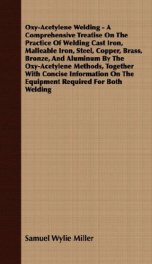oxy acetylene welding a comprehensive treatise on the practice of welding cast

PREFACE TEN years ago the oxy-acetylene method of welding and cutting metals was hardly more than a laboratory process, but in the course of these few years it has become one of the most important of the methods in the metal-working industries. It has made possible the making of repairs of broken machine parts that previously had to be replaced by entirely new castings or forgings. Not only has the process proved of the utmost importance in repair work, but its application has also been found to be of the greatest value in the manufacture of many articles. Much has been published relating to this process, but a great deal of that which has been placed on record in the past has been descriptive of odd jobs. It is, therefore, believed that the present volume, dealing in a more systematic manner with the principles and practice of the art of oxy-acetylene welding, will be of considerable value to those engaged in the metal trades. The information here presented on the subjects of oxy-acetylene welding and cutting has been mainly furnished by S. W. BiIiller, proprietor of the Rochester Welding Works, whose wide experience in the practical applicatibn of the process and whose success in the work vouch for the reliability of the information here placed on record. The experience of the author in the oxy-acetylene welding field has been unusually extensive, but having been mostly on repair work, he has written especially for those engaged in a similar line. A great deal of the work done with the oxy-acetylene welding torch is on repairs, and while there are also a great many applications of it in manufacturing work, such applications are more or less special in each case, and sometimes require a great deal of experimenting before success is attained. The general principles here resented, however, apply equally to repair and manufacturing work. v vi PEP ACE In the publication of this volume the Publishers have also made use of several articles by other authors, especially articles by Julius Springer, which from time to time have been published in MACHINERY. A chapter on Lead Burning, by James F. Hobart, has also been included. This material has been added in order to give as complete and comprehensive information as possible. In general, time and cost data have purposely been omitted in the chapters on oxy-acetylene welding, because, in the present state of the art, it is difficult, if not impossible, to give accurate cost data on repair work. Two welders, working on repairs of a similar character, will often vary as much as fifty per cent in the time consumed, and, as shop conditions also vary to a great extent, it is almost impossible to give accurate figures regarding cost. This volume describes the equipment required for oxy-acetylene welding and cutting, deals in detail with the methods used for welding cast iron, malleable iron, steel, copper, brass, bronze, and aluminurn, and gives, in addition, special attention to the welding of sheet metal, tank welding, boiler repairs, etc., as well as to the subject of lead burning, which is really a kind of autogenous welding...
Users who have this book
Users who want this book
What readers are saying
What do you think? Write your own comment on this book!
write a commentif you like oxy acetylene welding a comprehensive treatise on the practice of welding cast try:
Do you want to read a book that interests you? It’s EASY!
Create an account and send a request for reading to other users on the Webpage of the book!


